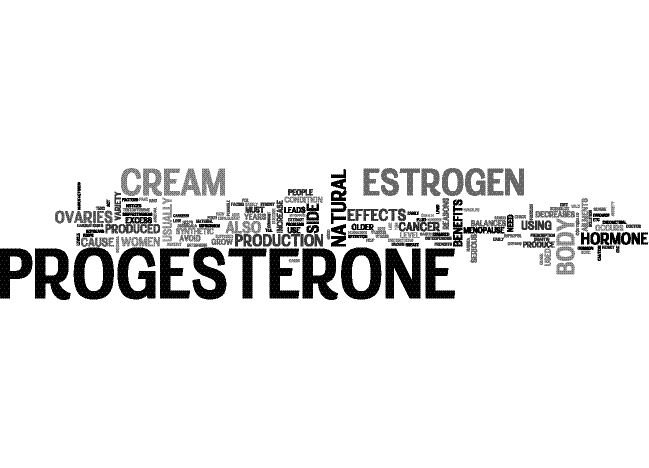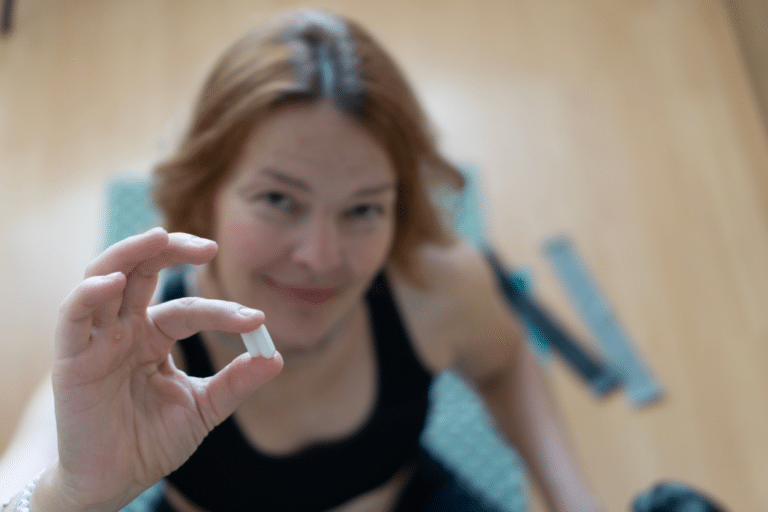Progesterone is a go-to supplement for many women in perimenopause (and menopause, for that matter). It is very safe and widely available over-the-counter in cream forms, as well as, by prescription in oral form. Despite the widespread availability and safety, many myths abound in the medical community and there is a lot of misunderstanding among women who read conflicting information online. Here are some of the most common myths and concerns I see in my online community.
1. Oral and Topical Doses Are Interchangeable
This is false. There’s a lot of confusion around why a woman would choose progesterone cream or capsules. And understandably so, since they are the same compound in different dosage forms. Both products are bioidentical.
Oral progesterone is most commonly used to help women with insomnia. Why? When progesterone passes through your liver to be metabolized, three metabolites are created. One is a compound called allopregnanolone. This makes you sleepy if your body prefers the correct pathway (a DUTCH test sorts this out).
However, 80-90% of the oral dose is removed by the liver. This isn’t a bad thing; it’s just the body’s way of handling the oral dose. So, if you want to compare an oral dose to a topical dose, a good rule of thumb is that an oral dose of 100 mg is more or less equal to 10-20 mg of a topical cream.
For all purposes other than insomnia, the cream is fine (and available over the counter). It is made from diosgenin, which is extracted from wild yams and converted in the lab into bioidentical progesterone. Your body cannot do this conversion on its own, which is why plain old wild yam cream doesn’t work. Oral progesterone requires a prescription.
2. Progesterone and Progestins Are the Same Thing
This is also false. The medical community has lumped PROGESTERONE into the category of PROGESTINS. Progesterone is chemically identical to the hormone made by your body. PROGESTINS are not chemically identical and may have many side effects such as acne, breast pain, nausea, weight gain, headaches, and irregular periods. Synthetic progestins are found in medroxyprogesterone, IUDs, implants, and oral contraceptives, including the “mini-pill.”
3. Progesterone Causes Cancer
Also false. We have long known that estrogen replacement given without progesterone to women who still have a uterus causes endometrial cancer, so progesterone is an important part of preventing cancer when HRT is used.
However, questions arose in 2002 when the huge Women’s Health Initiative study was stopped early because the data showed an increase in breast cancer, heart disease, blood clots, and strokes in women who were given traditional HRT (synthetic estrogen and medroxyprogesterone). As a result, millions of women were thrown into hormone hell when they were abruptly taken off the drugs.
In the study, women were given synthetic estrogen (conjugated equine estrogen) PLUS synthetic progestin (medroxyprogesterone), or synthetic estrogen alone (for women who had hysterectomies), or placebo (sugar pill). Bio-identical progesterone was NOT studied.
The results showed that women in the two-drug group were 24% more likely to develop breast cancer than women in the placebo group. However, women in the estrogen-alone group did NOT have an increased risk (and in fact, the trend was toward reduced risk). Further subanalysis showed that the SYNTHETIC PROGESTIN was actually the culprit causing the increased breast cancer risk.
There is NO evidence that bioidentical progesterone causes cancer, and in fact, it may have a protective effect.

Want to create a custom longevity health plan?
You’re in the right place.
I can help you with a functional approach to midlife women’s health including hormone balance, gut health, autoimmune issues, bone health, heart health and more!
4. Progesterone is Not Needed After a Hysterectomy
Another myth! Many doctors still subscribe to that old-school thinking and may tell you that you don’t need progesterone since you no longer have a uterus to protect from estrogen effects. Do not buy this. Advocate for yourself… progesterone has positive effects on the body that go far beyond uterine protection. These include helping with anxiety and mood swings, bone health, nerve health, and weight management. Request that you be prescribed bioidentical estrogen (estradiol) in a topical form along with progesterone capsules or cream. Progesterone cream is available over the counter.
5. Progesterone Helps/Worsens Anxiety
Both of these situations can be true depending on the balance of other hormones. For women with normal cortisol, progesterone can be a life-saver when it comes to anxiety. It is a calming hormone and it gets into the brain, thus calming the racing, worried mind. Relief is usually very rapid.
However, if cortisol is low and the body needs to produce more, progesterone is the substance that’s used to manufacture more cortisol. This will cause an even more wired, anxious feeling when beginning progesterone. The only way to know for sure if this is the case is to test cortisol throughout the day using saliva or DUTCH test.
Dr. Anna Garrett is a menopause expert and Doctor of Pharmacy. She helps women who are struggling with symptoms of perimenopause and menopause find natural hormone balancing solutions so they can rock their mojo through midlife and beyond. Dr. Anna is the author of Perimenopause: The Savvy Sister’s Guide to Hormone Harmony. Order your copy at www.perimenopausebook.com.
Dr. Anna is available for 1-1 consultations. Find out more at www.drannagarrett.com/lets-




